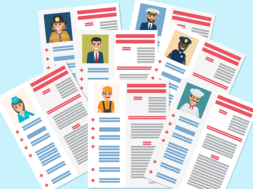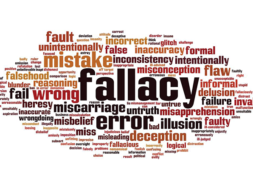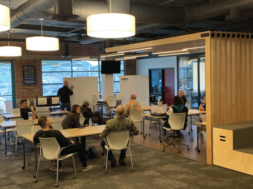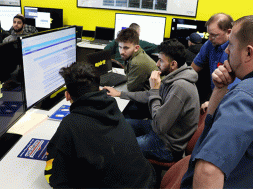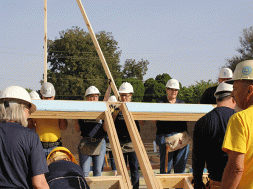
Career Services and Employer Engagement in a COVID-19 World
By Micaela Alpers, President, Education Division, Career TEAM, LLC
Disruption does not begin to describe the way Coronavirus has forced career colleges to pivot campus operations quickly and aggressively across the country. Successful institutions moved to virtual course delivery and remote operations nearly overnight. Beyond robust career education, securing employment in a student’s field of study upon graduation is the ultimate measuring stick of our success.
A strong focus on career development and employer engagement is critical to the successful placement of graduates and we cannot lose sight of this as we navigate through COVID-19.
Proactive institutions recognize this and have adapted their service delivery models to meet the needs of students, staff, employers, and the communities we serve. While COVID-19 has forced our hand to make these changes, it has also served as a catalyst for campus leadership to take a candid look at existing processes and embrace opportunities to upgrade their career services operation while creating efficiencies and scale.
Student preparation:
Students typically fall into one of three categories as it relates to their desire for career service’s support. These categories include:
- One-on-one coaching
- Group workshop engagement
- Self-service models
While students have their engagement preferences, even in a non-COVID-19 operating environment, most institutions offer service delivery models that meet the needs of one or two of their student groups. All of these engagement models can be mirrored in a remote delivery model with a little creativity and strategic execution.
Many campuses rely heavily on one-on-one coaching for resume preparation, mock interviews, and other career preparation activities. This model is time intensive for staff and requires significant student to staff ratios to achieve success. In addition, it creates a barrier for the very student population we serve. The typical career services advisor is on campus, or online, from 9:00 am to 5:00 pm. We ask students that are taking a full-time course load while balancing work, family, and other responsibilities to avail themselves during prime daytime hours for this critical, yet largely ignored step in their academic journey. Regardless of the pandemic, efficiency and access are key issues in this model.
To address this, many institutions have adapted the “flipped classroom” model for career services.
The flipped classroom approach means that students learn about a topic through their homework, simulations, and LMS prior to attending a class lecture on the topic. In doing so, students come with prerequisite knowledge of the topic and faculty become coaches available to answer questions and troubleshoot as opposed to lecturing to the lowest common denominator in the classroom. As it relates to career services, there are a growing number of technology platforms available for career development. By leveraging these resources, students can utilize simulations and tools to create resumes, cover letters, and complete mock interviews; thus, coming to their career service’s appointment with a first pass and these documents already completed. On average, career advisors report a 45-minute time savings per appointment by having students come to the table with the necessary career documents in hand. By employing a “flipped classroom” model for one-on-one student coaching, institutions increase staffing ratios, allow students to engage 24/7 through career services technology platforms and free up time for employer engagement activities.
Workshops are widely utilized for career service departments across the country. Proactive institutions have invested in platforms like Zoom and Microsoft Teams for remote classroom engagement and should repurpose these investments for career service’s operations as well. However, the effectiveness and perceived value of these sessions can vary widely by campus and facilitator. To optimize these workshop sessions, lesson plans must be properly adapted for online delivery and facilitators need to be well trained on the web conferencing technology adopted by their institution. Many platforms include breakout group features as well as polling and chat functions that can dramatically improve the student experiences and retention of key information. Students should also leave these live sessions with something tangible in their hands as a result of attendance. In other words, if they are learning about financial literacy or resume creation, they should leave with a budget or resume in hand.
By moving workshops online, multi-campus systems can also create a centralized delivery model in which students participate from various campuses. By implementing a system-wide calendar of career services engagements, scheduling is centered around student preferences. Facilitators are no longer bound by campus location and are selected based on subject matter expertise. This efficiency creating model should remain in a post COVID-19 environment.
Finally, by leveraging on-demand tools for the self-service student group, we must ensure that student activity is still tracked and monitored by staff to ensure quality and concierge level support. This can be accomplished with a robust career services management system that provides reporting dashboards on student progress towards key career information such as employment preferences, mock interview completion and reviews of necessary career documents.
Paperwork
Another challenge that has plagued career services is the sheer volume of compliance measures that are still executed via paper and pencil on many campuses across the country. This issue has been amplified as campus operations have been disrupted and students are no longer available to sign paperwork by stopping in the career services office on campus. Employment verification documents, surveys, waivers, release forms, externship site agreements, timesheets, and skills checklists are just a handful of the compliance documents career services advisors are responsible for maintaining on a day to day basis. Successful institutions are proactively exploring opportunities to automate the release of documents by integrating student status triggers within the student information system and capturing data and responses within their career services management system. Once configured, follow ups are set on timers and staff are managing the process for their entire caseload at once. In addition to time savings and efficiency, fraud and manual calculation errors are reduced when technology is utilized to capture data.
This shift in automation has a bigger and somewhat hidden impact on the overall paradigm of what it means to be a career service advisor.
By shifting foundational job responsibilities, leadership teams can reimagine a more “employer centric” career service model all together. Suddenly the career service advisor takes on a different hiring profile all together.
Ideally, career service advisors are proactive problem solvers with strong business acumen and the ability to engage with employer partners from owner to front line staff. In reality, on many campuses the majority of the career service advisor’s time is spent on compliant paperwork and ensuring all documentation is in place before their next reporting deadline. This will persist until leadership teams take a hard look at their manual processes and figure out ways to leverage technology for automation and support.
Employer engagement
Never has there been a time that employer engagement is more important than now. Simply put … partners stay, vendors go away. Logistically speaking, web conferencing tools have already been adopted for remote classroom instruction. Hopefully, career service advisors have adopted these tools for group engagement and one-on-one student coaching. The same tools can be utilized for employer partnership meetings, virtual advisory boards, and even hiring events.
While there is certainly something to be said for a face-to-face employer site visit, time savings is realized when we are able to meet with several employers in a day without spending time navigating from campus to employer sites and back to campus again. Additionally, this is another opportunity for multi-campus operations to think beyond campus location to take a centralized approach to the entire career service’s operation. We can now leverage our best employer engagement advisors instead of feeling bound by geography. Many institutions have already adopted a centralized employer engagement approach in their pursuit of building national employer networks and the same methods can be executed for local and regional employer partnership building.
In addition to prioritizing employer engagement and centralizing talent, we must up-level the conversation. Strong employer engagement specialists enter into employer site visits with a mindset of providing solutions and problem solving. How have companies changed hiring priorities, trained staff for work from home, and mitigated risk for their operations? What are their biggest concerns as they plan for the coming month, quarter, and year of operating through a pandemic? A strong employer centric advisor will not only translate the answers to these questions to employment opportunities for upcoming graduates, but they will also listen for clues on new training opportunities that will position institutions as a partner of choice while potentially generating revenue in the process.
None of us knows how long COVID-19 will impact the ways in which we operate campuses from admissions to job placement. While this crisis has caused swift and immediate changes in operations, forward thinking colleges will use this as an opportunity to re-evaluate brick and mortar operations and retain strategies that create a better experience for students, staff, employers and our communities at large. As it relates to career services, student preparation and employer engagement will benefit from looking at ways to scale, automate, and centralize their people, process, and technology from every direction.
MICAELA ALPERS, President of Career TEAM’s Education Division, brings a background in higher education, coaching, and career development to the organization. Micaela strongly believes that education is a gateway to empowerment, confidence, and most of all – choice! As a result, what excites her the most about her role is sharing Career Team’s 20+ years of Workforce Development experience with partner institutions and, ultimately, with graduates. Prior to CTL, she served as National Director of Sales for McGraw Hill Education. Micaela completed the Accomplishment Coaching leadership and coaches training program in 2013 and she is also a certified trainer in the Aha! Process, Bridges Out of Poverty program. Micaela is a Cum Laude graduate from San Diego State University with a BA in International Business, and she lives in Denver CO.
Contact Information: Micaela Alpers // President, Education Division // Career TEAM, LLC // 619-559-8134 // micaela@careerteam.com // careerteam.com // https://www.linkedin.com/in/micaelaalpers/

